Ladies and Gentlemen, start your word processors …
![]() The House of Commons’ Culture, Media and Sport Committee today announced a new inquiry into the challenges and opportunities for the creative industries arising from the development of new media platforms.
The House of Commons’ Culture, Media and Sport Committee today announced a new inquiry into the challenges and opportunities for the creative industries arising from the development of new media platforms.
For the purposes of the inquiry, the term “creative industries” includes music, visual broadcasts, sound broadcasts, film, graphic art, design, advertising, fashion and games software.
The Committee is particularly interested in receiving evidence on the following issues:
- The impact upon creative industries of recent and future developments in digital convergence and media technology
- The effects upon the various creative industries of unauthorised reproduction and dissemination of creative content, particularly using new technology; and what steps can or should be taken – using new technology, statutory protection or other means – to protect creators
- The extent to which a regulatory environment should be applied to creative content accessed using non-traditional media platforms
- Where the balance should lie between the rights of creators and the expectations of consumers in the context of the BBC’s Creative Archive and other developments
Written submissions are invited from any interested organisation or individual by Thursday 19 January 2006.
 Submissions should give the name and postal address of the person sending the memorandum and should state whether it has been prepared specifically for the Committee. If the memorandum is from an organisation rather than an individual, it should briefly explain the nature and membership of the organisation. The Committee may publish some of the submissions it receives.
Submissions should give the name and postal address of the person sending the memorandum and should state whether it has been prepared specifically for the Committee. If the memorandum is from an organisation rather than an individual, it should briefly explain the nature and membership of the organisation. The Committee may publish some of the submissions it receives.
For more guidance on the preferred format, see http://www.parliament.uk/commons/selcom/witguide.htm
Submissions should be sent to the Clerk of the Committee at the address below.
Kenneth Fox
Clerk of the Culture, Media and Sport Committee
House of Commons
7 Millbank
London SW1P 3JA
[email protected]
Luke Gibbs writes for Ofcomwatch.
 The rollout of ADSL2+ in the UK appears to be going through a reverse-hype process, with people saying it’s not going to deliver high speeds to most people. That may be partially true, but in urban areas where people are within 1.5Km of the exchange they should get 20Mb/s+.
The rollout of ADSL2+ in the UK appears to be going through a reverse-hype process, with people saying it’s not going to deliver high speeds to most people. That may be partially true, but in urban areas where people are within 1.5Km of the exchange they should get 20Mb/s+. Poor old BT. Now that it’s reached a settlement with OfCom that allows it to keep retail and wholesale arms under one, some would say, severely stretched umbrella, commentators emerge from cover and say it might be better if it’d spit into two (or more) parts. The cost of
Poor old BT. Now that it’s reached a settlement with OfCom that allows it to keep retail and wholesale arms under one, some would say, severely stretched umbrella, commentators emerge from cover and say it might be better if it’d spit into two (or more) parts. The cost of 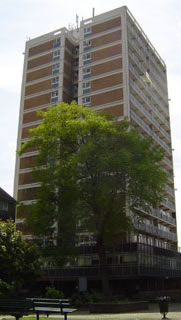 A project starting early next year in East London hopes to bridge the digital divide by broadband-enabling a number of housing estates.
A project starting early next year in East London hopes to bridge the digital divide by broadband-enabling a number of housing estates. Happily, this project is focused on the original residents, not the ones who live in the £1/2m flats – sorry, apartments.
Happily, this project is focused on the original residents, not the ones who live in the £1/2m flats – sorry, apartments. Additional services include a Health channel allowing patients to book GP appointments, provide virtual consultations and on-line health and diagnosis information; a Consumer Channel, allowing on-line group buying of common services such as gas, electricity and mobile phone tariffs; and an Employment Channel, providing on-line NVQ courses, local jobs Websites and virtual interview mentoring.
Additional services include a Health channel allowing patients to book GP appointments, provide virtual consultations and on-line health and diagnosis information; a Consumer Channel, allowing on-line group buying of common services such as gas, electricity and mobile phone tariffs; and an Employment Channel, providing on-line NVQ courses, local jobs Websites and virtual interview mentoring. This morning, Homechoice, the currently London-focused DSL-based VOD announced that they had appointed CSFB (Credit Suisse First Boston, as was) to raise new capital for their expansion around the UK.
This morning, Homechoice, the currently London-focused DSL-based VOD announced that they had appointed CSFB (Credit Suisse First Boston, as was) to raise new capital for their expansion around the UK. Their newly-announced ARPU (Average Revenue Per User) figures are impressive at £430, being considerably higher than Sky’s £384 (announced in 3 August 2005), but lower than Telewest’s £538 and ntl’s £477 (reported to ofcom, Q2 2005).
Their newly-announced ARPU (Average Revenue Per User) figures are impressive at £430, being considerably higher than Sky’s £384 (announced in 3 August 2005), but lower than Telewest’s £538 and ntl’s £477 (reported to ofcom, Q2 2005).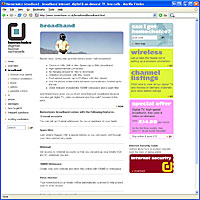 The wires are hot with rumours that BSkyB is contemplating a bout of wad waving in the direction of the video-on-demand, broadband and telephone company Homechoice, which is reportedly finding things tres tricky in the increasingly competitive TV broadband market.
The wires are hot with rumours that BSkyB is contemplating a bout of wad waving in the direction of the video-on-demand, broadband and telephone company Homechoice, which is reportedly finding things tres tricky in the increasingly competitive TV broadband market. Homechoice currently provides a broadband Internet and telephone service, with on-demand programmes covering comedy, drama, music soaps, pay-per-view movies and home shopping.
Homechoice currently provides a broadband Internet and telephone service, with on-demand programmes covering comedy, drama, music soaps, pay-per-view movies and home shopping. BSkyB’s Director of Product Management, Gerry O’Sullivan couldn’t help sounding smug as he took centre stage at The Connected Home conference in London today.
BSkyB’s Director of Product Management, Gerry O’Sullivan couldn’t help sounding smug as he took centre stage at The Connected Home conference in London today. While Microsoft’s Cynthia Crossley and Telewest’s Mark Horley nodded collaboratively to Merlin Kister of Intel’s assertion that “We mustn’t be close minded and pick a winner. It’s important for all players to work together,” O’Sullivan looked disinterested.
While Microsoft’s Cynthia Crossley and Telewest’s Mark Horley nodded collaboratively to Merlin Kister of Intel’s assertion that “We mustn’t be close minded and pick a winner. It’s important for all players to work together,” O’Sullivan looked disinterested. “There’s zero tolerance (among our customers) for that sort of unreliability and pain…we can only roll out products that you switch on and they work.”
“There’s zero tolerance (among our customers) for that sort of unreliability and pain…we can only roll out products that you switch on and they work.” Horley mentioned that Telewest was launching its own 160GB PVR in early 2006, with the WHOLE disc available for recording “as we already offer video on demand”.
Horley mentioned that Telewest was launching its own 160GB PVR in early 2006, with the WHOLE disc available for recording “as we already offer video on demand”. The futuristic vision of a connected home with content moving seamlessly from our TV to our PC and on to our mobile device is still a long way off, according to key speakers at The Connected Home conference in London today.
The futuristic vision of a connected home with content moving seamlessly from our TV to our PC and on to our mobile device is still a long way off, according to key speakers at The Connected Home conference in London today. It took Dimitri Van Kets (pictured left), from Belgian telco, Belgacom, to voice what many were thinking by announcing that the networked home was “little more than a mass of standards” and “too confusing” for the average consumer. Unless the service providers get together and educate customers, he said, true home connectivity was never going to happen.
It took Dimitri Van Kets (pictured left), from Belgian telco, Belgacom, to voice what many were thinking by announcing that the networked home was “little more than a mass of standards” and “too confusing” for the average consumer. Unless the service providers get together and educate customers, he said, true home connectivity was never going to happen. Paul Szucs of Sony said that service providers should “try not to lose the plot with content protection”, adding that “consumers simply want their devices to work together and share content.”
Paul Szucs of Sony said that service providers should “try not to lose the plot with content protection”, adding that “consumers simply want their devices to work together and share content.”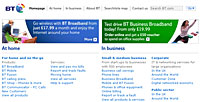 BT is planning to turbo-boost broadband connectivity by quadrupling basic connectivity speeds to 8mbps nationwide and giving the service a snappy name, “ADSL Broadband Max”.
BT is planning to turbo-boost broadband connectivity by quadrupling basic connectivity speeds to 8mbps nationwide and giving the service a snappy name, “ADSL Broadband Max”.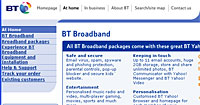 The 8mbps service will see BT reaching the theoretical top ADSL speeds it announced when the broadband service first launched in 2000.
The 8mbps service will see BT reaching the theoretical top ADSL speeds it announced when the broadband service first launched in 2000. With the industry rapidly consolidating, BT is coming under increasing pressure from newly merged uber-telecos like Telewest/NTL and Sky/Easynet, with the former already offering speeds of more than 8mbps for no extra charge on existing broadband subscriptions.
With the industry rapidly consolidating, BT is coming under increasing pressure from newly merged uber-telecos like Telewest/NTL and Sky/Easynet, with the former already offering speeds of more than 8mbps for no extra charge on existing broadband subscriptions. Elsewhere, BT has started trialling optical fibre broadband services in Wales, connecting business to ultra-high-bandwidth services using strands of blown fibre run along using existing telegraph poles.
Elsewhere, BT has started trialling optical fibre broadband services in Wales, connecting business to ultra-high-bandwidth services using strands of blown fibre run along using existing telegraph poles.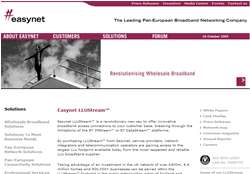 As we reported last week, Easynet has been bought by Sky – as long as they get shareholder approval, but since Sky have offered a premium on Easynet’s shares, this should be a done deal.
As we reported last week, Easynet has been bought by Sky – as long as they get shareholder approval, but since Sky have offered a premium on Easynet’s shares, this should be a done deal. Even though Sky are buying into LLU, Easynet only cover around 250 exchanges and currently all the voice goes to BT (Easynet use the shared metallic path LLU option), while Sky are likely to want to take the phone service as well (they already have a SkyTalk package using CPS provided by THUS). Sky will need to invest to make this a reality as well as increasing Easynet’s coverage. They have said they want to go into around 1000 exchanges, so that’s a build out of around 750 – which won’t be cheap (probably another £100m’ish at least).
Even though Sky are buying into LLU, Easynet only cover around 250 exchanges and currently all the voice goes to BT (Easynet use the shared metallic path LLU option), while Sky are likely to want to take the phone service as well (they already have a SkyTalk package using CPS provided by THUS). Sky will need to invest to make this a reality as well as increasing Easynet’s coverage. They have said they want to go into around 1000 exchanges, so that’s a build out of around 750 – which won’t be cheap (probably another £100m’ish at least). If all the LLU players aggregated infrastructure and competed on services, they could build a 21CN of their own now. LLU competition is going to be fiercely competitive with Wanadoo, AOL, Sky and even Be offering a triple-play – all competing for the same customers. – as well as BT (who will have nationwide coverage) and not ignoring NTL/Telewest who are also going into LLU.
If all the LLU players aggregated infrastructure and competed on services, they could build a 21CN of their own now. LLU competition is going to be fiercely competitive with Wanadoo, AOL, Sky and even Be offering a triple-play – all competing for the same customers. – as well as BT (who will have nationwide coverage) and not ignoring NTL/Telewest who are also going into LLU.